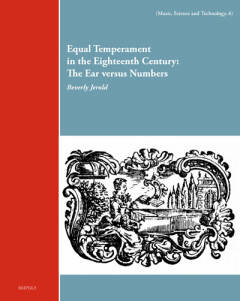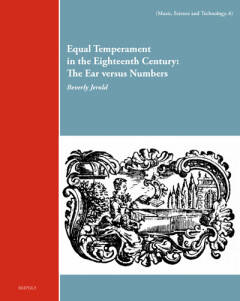
- Afhalen na 1 uur in een winkel met voorraad
- Gratis thuislevering in België vanaf € 30
- Ruim aanbod met 7 miljoen producten
- Afhalen na 1 uur in een winkel met voorraad
- Gratis thuislevering in België vanaf € 30
- Ruim aanbod met 7 miljoen producten
Zoeken
Equal Temperament in the Eighteenth Century
The Ear Versus Numbers
Beverly Jerold
Hardcover | Engels
€ 106,00
+ 212 punten
Omschrijving
Today, many have urged early music specialists to adopt a historical unequal temperament for keyboards and harps, and even for instruments whose frets produce equal temperament naturally. Equal temperament, however, played a significant role during this period, but most writing today has stressed the numbers from early mathematicians who believed that the more just intervals a temperament has, the better it will be. Major writers, however, pressed for equal temperament because it enabled full use of the keyboard, transposition, and enharmonic notes. In contrast, the major and minor semitones of unequal temperaments, and their flats pitched higher than sharps, limited the keyboard's usable compass and made enharmonic notes and transposition impossible. As advanced thinkers were aware, performers with pitch flexibility did not follow the theorists' numbers. An accompaniment in equal temperament offered them free rein to find the best intonation because its ratios for fourths and fifths are closest to the natural ones. Among the many writers who supported equal temperament was Jakob Adlung, who observed that the theorists' calculations gave rise to the argument: "Whether the ear or the numbers should judge if music sounds in or out of tune".
Specificaties
Betrokkenen
- Auteur(s):
- Uitgeverij:
Inhoud
- Aantal bladzijden:
- 186
- Taal:
- Engels
Eigenschappen
- Productcode (EAN):
- 9782503606750
- Verschijningsdatum:
- 10/05/2023
- Uitvoering:
- Hardcover
- Formaat:
- Genaaid
- Gewicht:
- 693 g

Alleen bij Standaard Boekhandel
+ 212 punten op je klantenkaart van Standaard Boekhandel
Beoordelingen
We publiceren alleen reviews die voldoen aan de voorwaarden voor reviews. Bekijk onze voorwaarden voor reviews.











